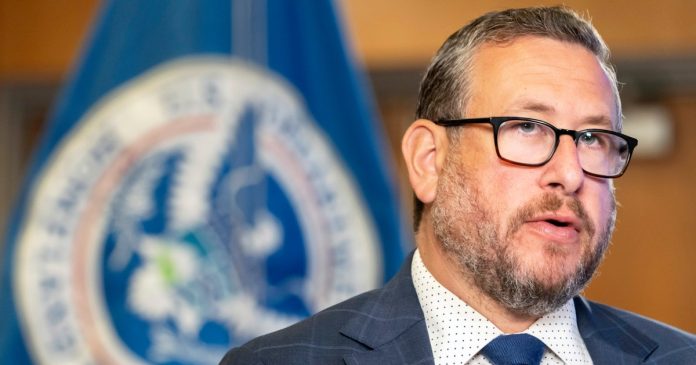The Trump administration said Tuesday it had launched a “first-of-its-kind” operation looking into 1,000 cases to identify immigration fraud in the Minneapolis-St. Paul area. Officials warned that immigration authorities would continue such operations around the country.
U.S. Citizenship and Immigration Services said that in investigating those cases, it found 275 cases of “suspected fraud.” Of those, 42 cases were referred to Immigration and Customs Enforcement or people were given notices to appear in court for immigration proceedings, USCIS said in a statement Tuesday afternoon. Four people were apprehended, the agency said. No one has been charged.
“We will continue to launch operations like this across the country,” USCIS Director Joseph Edlow said at a news conference Tuesday in Minneapolis. “We will be bringing many more efforts like this to cities across the country.”
USCIS assesses applications and interviews immigrants seeking to legally remain in the country by getting green cards, becoming naturalized citizens or being approved for humanitarian programs.
Edlow said officers “encountered blatant marriage fraud, visa overstays, people claiming to work at businesses that can’t be found, forged documents” and other allegations of immigration fraud.
Some of the troubling cases the agency said it found included that of an immigrant who was alleged to have taken advantage of an elderly U.S. citizen in a case that involved threats and “severe neglect” and that of an immigrant who was alleged to have admitted to officers she committed marriage fraud only a few hours after having sworn in in immigration interview that her marriage was legitimate, Edlow said.
He said “troubling patterns” were also found with the federal Uniting for Ukraine program, which granted temporary humanitarian parole for Ukrainians fleeing the ongoing war with Russia during the Biden administration. Edlow said one person had filed to sponsor more than 100 Ukrainians. He did not provide further details about the case or its outcome.
“I want the American people to know that we are declaring war on immigration fraud,” Edlow said. “We will continue to pursue those who seek to abuse our immigration system using every tool at our disposal.”
Edlow said that in many cases, “we will be looking at grants of immigration benefits already given. We will be looking at other patterns, and we will be reopening [and] re-examining benefits to determine whether rescission revocation is appropriate in any of these cases.”
He said people who commit immigration fraud could find themselves without benefits and prosecuted.
The agency said the types of cases it looked into included marriage and family-based petitions, employment authorization and certain requests for temporary parole into the country.
While 1,000 cases were investigated for possible fraud, the fact that only 42 were either referred to ICE or issued notices for appearance in immigration court represents “less than 5%,” said Claire Trickler-McNulty, who was a senior USCIS official during the Biden administration. She was also an official with the Department of Homeland Security during the Obama administration and the first Trump administration.
“I would wonder if this was an effective use of resources,” she said. “It’s not like there’s a lot of extra staff there, because everybody’s trying to work through all the cases and backlogs that exist. So when you’re moving resources around, it’s at the cost of probably another operational goal.”
In any large, bureaucratic system, there will be “bad actors,” and there need to be “processes and procedures in place to root out fraud,” Trickler-McNulty said. She said there is also fraud targeting immigrants, such as attorneys or people impersonating attorneys looking to take advantage of people seeking to remain in the United States.
The announcement comes amid multiple recent changes for the agency, which has long been kept separate from immigration arrests and enforcing deportations, although it does refer cases it suspects of fraud to ICE.
Last month, the agency announced it would add its own law enforcement officers who could carry firearms and make arrests. The agency said those special agents “will be empowered to investigate, arrest, and present for prosecution those who violate America’s immigration laws.”
Other recent changes at the agency heighten scrutiny for immigrant applicants. In a memorandum last month, USCIS said it would resume “neighborhood investigations,” which could include interviews with applicants’ neighbors and co-workers, a practice that was waived in 1991.
USCIS also updated guidance in its policy handbook in August to review and consider any “anti-American ideologies or activities,” including on social media, in deciding whether to issue immigration benefits. “Anti-American activity will be an overwhelmingly negative factor in any discretionary analysis,” the guidance said.
In August, the agency also announced a new policy that targets marriage and family-based petitions for green cards. New guidance said federal immigration authorities may begin removal proceedings for immigrants who lack legal status and apply to become residents through spouses or family members. The agency said the rule applied to pending requests and those filed on or after Aug. 1.
Immigration policy and legal experts told NBC News that the policy broadly targeted a major pathway for some immigrants seeking green cards.
The policy would affect not only immigrants who entered the country illegally and were seeking green-card status as a means to remain, but also people whose legal visas expire while they wait for decisions on green cards, experts said. The policy could also affect people who arrived in the United States under the Deferred Action for Childhood Arrivals act, known as Dreamers, and hundreds of thousands of immigrants whose legal status is in jeopardy after the Trump administration moved to cancel temporary legal pathways instituted during the Biden administration, the experts said.

Daniella Silva
Daniella Silva is a national reporter for NBC News, focusing on immigration and education.


